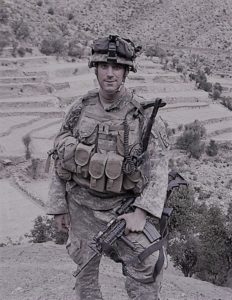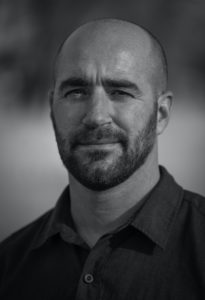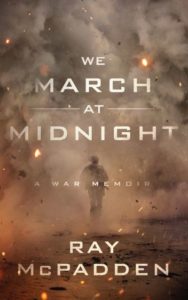By Ray McPadden
I’m in love with saying I told you so. It feels good. Ten years after my last combat tour, I wrote We March at Midnight, about leading some of the most dangerous missions during the height of the Afghan and Iraq wars. I could have used the book to say I told you so to many people, to spell out things I knew were true but didn’t totally understand in the moment. I did not. Time and distance from war equipped me with wisdom. Had I written the book shortly after returning, it would have been different, because when loss and regret are fresh, the mind brims with poisonous thoughts, blame, and plenty of self-pity, all fertile ground for I told you so.
Stories don’t exist without people
Good stories are ultimately about people. In this way a narrative can change with time. The mind changes. Memories change. I served in a war beside the finest Americans, who endured incredible hardship and horror, facing the impossible with honor and dignity. Though privately, I did not like everyone I served with. I even wished bad things on others. A veteran that tells you they got on with everyone all the time is lying. Some guys died because of other guys—not something I care to dwell on, except to say it wasn’t categorically bad intent; some people are just hapless.
There is a heap of blame to distribute. Some is for me. While writing, the temptation to lash out at others can be strong, almost overpowering. The book was a chance to settle scores. Important too, I want to sell books, and drama sells, so to entirely avoid attacking others—to make everyone a great guy—risks castrating the story. It’s a delicate balance, and there is no right answer. As a matter of personal taste, I refrained from attacks on others because they couldn’t respond in turn. I told you so is a dangerous game.

Ray McPadden, back in the day
Listen to others who were there
Wade into competing narratives while writing. Be hard on yourself. You may find no singular truth. In interviews with my own Rangers, I was stunned by differing memories of firefights. Things like size of enemy force, who did what, team members present, and even who had been wounded were sometimes in dispute. The scientific literature on eyewitness memory is rich, so I shouldn’t be surprised.
A dozen people can see the same thing and remember it a dozen different ways, even more so when it’s life and death.
As you progress beyond first drafts, you will have to decide what the truth is. You might even realize you are not the hero.
Triangulate your memories with those of others. Or pull that old trunk out of the closet, remembering past events with journals, emails, letters home. Vets can look up write-ups for combat awards. Of course video recordings and photos will take you back, giving you plenty to write about.
The Biggest Bureaucracy in America
With people aside, the great wall for the aspiring military memoirist is the establishment itself, the fabled Department of Defense (the Department). As an Army Ranger Officer leading strategic missions of national importance, I obtained a high-level security clearance, Top Secret—Secret Compartmentalized Information, to be exact, meaning I had access to very sensitive intelligence, but only pieces relevant to targeting and killing terrorist leaders. No one gave me the nuclear codes.
I signed a nondisclosure agreement, which obligates me to secrecy for decades, about what I did and what I know.
This doesn’t mean I can’t talk about anything, just not the sensitive parts. And hence, anyone writing about special operations should submit their draft manuscript to the Department for a mandatory review before publication.
The details of this intelligence review are hiding in the shadows or entirely obscure. One thing to know is that if you skip the review, the Department can take your firstborn. No Easy Day was the first book published about the raid to kill Bin Laden. The SEAL author had participated in the raid, and then cashed in on the most high-profile mission in modern military history to a sum of 6 or 7 million dollars. He skipped the Department review. Department finds out, activates a bevy of legal hitmen, and gets back every dime of his advance, all royalties, plus damages. Details of the event are beyond this article, and I am not personally familiar with what transpired behind the scenes. Fact of the matter is, the Department thumped its chest at the publishing world, aspiring authors, and their agents.
As far as protecting sensitive information, I used fake names in the manuscript. Identities of special ops troops are secret. That’s rule number one. I also avoided details which may have revealed identities—family information, where people live in the States, and so on.
The idea is to hide anything that may allow our nations’ enemies to target special operations troops, author included.
It is doubtful that I personally am on Al-Qaeda’s hitlist, though if so, it would give rise to something like vanity. Anyway I do wonder how Rob O’Neill, the SEAL that shot Bin Laden, carries on a public life as a regular contributor to Fox News (note he is not the same guy who wrote No Easy Day).
Self-censorship
Moving past names, I scrubbed the manuscript of anything that could be sensitive: tactics, equipment, intelligence gathering techniques, and certain missions that I’ll take to the grave. In theory the special operations author could include most everything and let the Department sort it out, but I’m the straight-ahead type. Failure to self-censor is also likely to lengthen the Departmental review, as it passes the censoring entirely to those in uniform.
Fortunately for me, my literary agent was both familiar with the national security review process and immensely helpful in getting me started with the Department. Once I submitted my manuscript, I waited. And waited. And then some more.
The more secretive your unit, the longer you wait. I deployed multiple times to hot places, and was involved in heavy duty missions, so I naturally had many in uniform lining up to carve on my manuscript. It didn’t help that I often pestered the point of contact with my publishing timetables, which elicited the same response every time, “We are working on it. Can’t give you a date of return.” We did this for months. It felt like geologic time.
Black boxes
Eventually the Department issued redactions. Black boxes on the page, covering sensitive material. Other special operations authors have chosen to include the black boxes in the published book, which I believe to be a sad gimmick. Some of the redactions on my manuscript were surprising, centered on mundane details of life overseas. The Department breezed by other things that seemed like giving away the keys to the White House. Like any human endeavor there is an element of subjectivity. The reviewers are people, and I suspect they are overworked. They must also drop kids at baseball practice. Military technology and operations evolve too.
Just do it
In the end, the Department might redact a sentence, or a paragraph, or entire sections and chapters. Many cases I could see the logic of the reviewer and the reason for the redaction; some of the time it seemed arbitrary and capricious. Even so, do not skip the review.
And finally, while waiting for the Department to get back to you, go ahead and start on your next book.
Let us know on Facebook if you have a comment or question about the national security review process, or about truth-telling in memoirs.

 Author of the award-winning novel, And the Whole Mountain Burned, Ray McPadden is a four-tour combat veteran and a former Ground Force Commander in an elite unit of Army Rangers. He earned a Purple Heart, two Bronze Stars, and a medal for valor during his combat tours, which included almost two years on the Afghan-Pakistani border during the height of the conflict. He now lives in Montana with his family.
Author of the award-winning novel, And the Whole Mountain Burned, Ray McPadden is a four-tour combat veteran and a former Ground Force Commander in an elite unit of Army Rangers. He earned a Purple Heart, two Bronze Stars, and a medal for valor during his combat tours, which included almost two years on the Afghan-Pakistani border during the height of the conflict. He now lives in Montana with his family.
If you’d like to know more about Ray’s experience writing We March at Midnight,
you can reach him at www.raymcpadden.com or on Instagram at #raymcpadden1.





